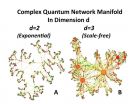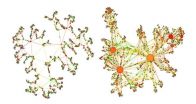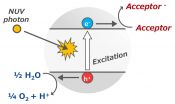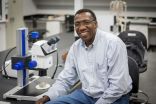Understanding of complex networks could help unify gravity and quantum mechanics
When the understanding of complex networks such as the brain or the Internet is applied to geometry the results match up with quantum behavior
2015-09-10
(Press-News.org) Mathematicians investigating one of science's great questions -- how to unite the physics of the very big with that of the very small -- have discovered that when the understanding of complex networks such as the brain or the Internet is applied to geometry the results match up with quantum behavior.
The findings, published today (Thursday) in Scientific Reports, by researchers from Queen Mary University of London and Karlsruhe Institute of Technology, could explain one of the great problems in modern physics.
Currently ideas of gravity, developed by Einstein and Newton, explain how physics operates on a very large scale, but do not work at the sub-atomic level. Conversely, quantum mechanics works on the very small scale but does not explain the interactions of larger objects like stars. Scientists are looking for a so called 'grand unified theory' that joins the two, known as quantum gravity.
Several models have been proposed for how different quantum spaces are linked but most assume that the links between quantum spaces are fairly uniform, with little deviation from the average number of links between each space. The new model, which applies ideas from the theory of complex networks, has found that some quantum spaces might actually include hubs, i.e. nodes with significantly more links than others, like a particularly popular Facebook user.
Calculations run with this model show that these spaces are described by well-known quantum Fermi-Dirac, and Bose-Einstein statistics, used in quantum mechanics, indicating that they could be useful to physicists working on quantum gravity.
Dr Ginestra Bianconi, from Queen Mary University of London, and lead author of the paper, said:
"We hope that by applying our understanding of complex networks to one of the fundamental questions in physics we might be able to help explain how discrete quantum spaces emerge.
"What we can see is that space-time at the quantum-scale might be networked in a very similar way to things we are starting to understand very well like biological networks in cells, our brains and online social networks."
INFORMATION:
[Attachments] See images for this press release:


ELSE PRESS RELEASES FROM THIS DATE:
2015-09-10
This news release is available in Japanese.
The Earth's atmosphere contains oxygen because plants continuously produce it through photosynthesis. This abundant supply of oxygen allows life forms like animals to flourish. Therefore, oxygen had been thought to be an essential biomarker for life on extrasolar planets. But now, a research assistant professor Norio Narita of the Astrobiology Center of National Institutes of Natural Sciences (NINS), which was founded in April 2015, and an associate professor Shigeyuki Masaoka, of the Institute of Molecular Science of NINS, ...
2015-09-10
DENVER (Sept. 10, 2015) - An international team of scientists, including one from the University of Colorado Denver and another from the University of Colorado Anschutz Medical Campus in Aurora, announced the discovery Thursday of a new species of hominin, a small creature with a tiny brain that opens the door to a new way of thinking about our ancient ancestors.
The discovery of 15 individuals, consisting of 1,550 bones, represents the largest fossil hominin find on the African continent.
"We found adults and children in the cave who are members of genus Homo but ...
2015-09-10
A new study conducted in collaboration with Facebook using anonymised data from the social networking site shows a correlation between people's social and financial status, and the levels of internationalism in their friendship networks - with those from higher social classes around the world having fewer friends outside of their own country.
Despite the fact that, arguably, people from higher social classes should be better positioned to travel and meet people from different countries, researchers found that, when it comes to friendship networks, people from those ...
2015-09-10
ATLANTA -September 10, 2015- A new study finds breast cancer incidence and death rates are increasing in several low and middle income countries, even as death rates have declined in most high income countries, despite increasing or stable incidence rates. The findings come from a new report examining global patterns and trends in breast cancer using the most up-to-date cancer registry-based data available. It appears early online in Cancer Epidemiology Biomarkers and Prevention.
Breast cancer is the most commonly diagnosed cancer among all women worldwide overall and ...
2015-09-10
Mothers who quit smoking in pregnancy are more likely to light-up again after their baby is born if they feel stressed - according to a new report from the University of East Anglia.
Researchers studied interviews with more than 1,000 new mothers and found that the stress of caring for a newborn, sleepless nights, social pressure, and the idea that they no longer need to protect the baby - all contribute to relapse.
The study also found that women who felt they were being supported by a partner were less likely to start smoking again.
Lead researcher Dr Caitlin Notley, ...
2015-09-10
Major European study moves a step closer to treatments for severe asthma
Initial findings from a major European study have helped identify key characteristics of severe asthma, which will help with the development of new treatments for patients with the condition.
The new paper, published online today (10 September, 2015) in the European Respiratory Journal, is one of the largest assessments of adults with severe asthma to date, looking at several characteristics including symptoms, patients' quality of life and blood and airway measurements.
Over 30 million adults ...
2015-09-10
A new study in Diabetologia (the journal of the European Association for the Study of Diabetes) is the first to show that high intensity intermittent exercise training improves heart structure and benefits diabetes control in patients with type 2 diabetes. The study is led by Professor Michael Trenell and Dr Sophie Cassidy from Newcastle University (UK) and was funded by the National Institute for Health Research.
People with type 2 diabetes are twice as likely as those without diabetes to have heart disease, and heart disease is the leading cause of death and complications ...
2015-09-10
Most men in Europe want to spend fewer hours at work and more time with their families even though it would cut their income, a major study on employment shows.
The common belief that higher-earning men like to work longer to build their careers is shown to be wrong by the study - men who earn the majority of their household's income were most likely to want to work less.
Sociologists Dr Shireen Kanji and Dr Robin Samuel also found that for men breadwinners the attraction of spending more time with their partner is as strong a pull as children's company.
Dr Kanji, ...
2015-09-10
PHILADELPHIA - A multiple myeloma patient whose cancer had stopped responding after nine different treatment regimens experienced a complete remission after receiving an investigational personalized cellular therapy known as CTL019 developed by a team at the University of Pennsylvania. The investigational treatment was combined with chemotherapy and an autologous stem cell transplant - a new strategy designed to target and kill the cells that give rise to myeloma cells.
The team's findings are published in a case report today in the New England Journal of Medicine. Prior ...
2015-09-10
PHILADELPHIA--Of the more than 50 known lysosomal storage diseases (LSDs)-rare inherited metabolic disorders-only seven can be treated with approved enzyme-replacement therapies. Lysosomal acid lipase deficiency (LALD) is an LSD that causes fatty liver disease and cirrhosis. There is no treatment for the disease, which afflicts 1- 40,000 - 1 in 300,000 people across the world. In this week's New England Journal of Medicine, researchers report results of a trial showing the efficacy of a new enzyme-replacement therapy for LALD. In an accompanying editorial, Daniel J. Rader, ...
LAST 30 PRESS RELEASES:
[Press-News.org] Understanding of complex networks could help unify gravity and quantum mechanics
When the understanding of complex networks such as the brain or the Internet is applied to geometry the results match up with quantum behavior



